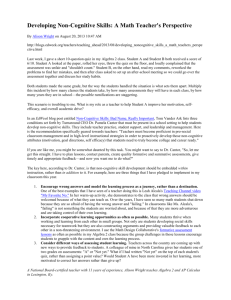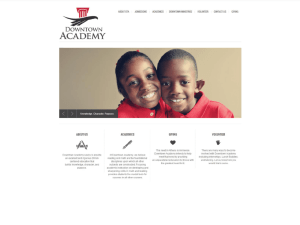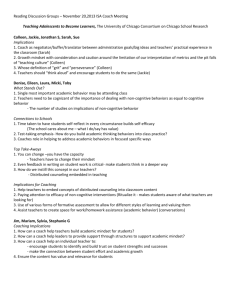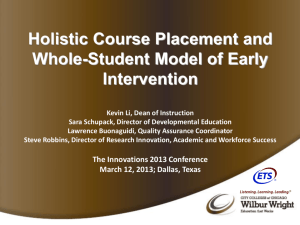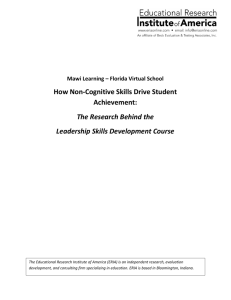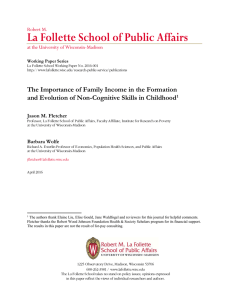College Preparation Beyond GPA and Standardized Tests
advertisement
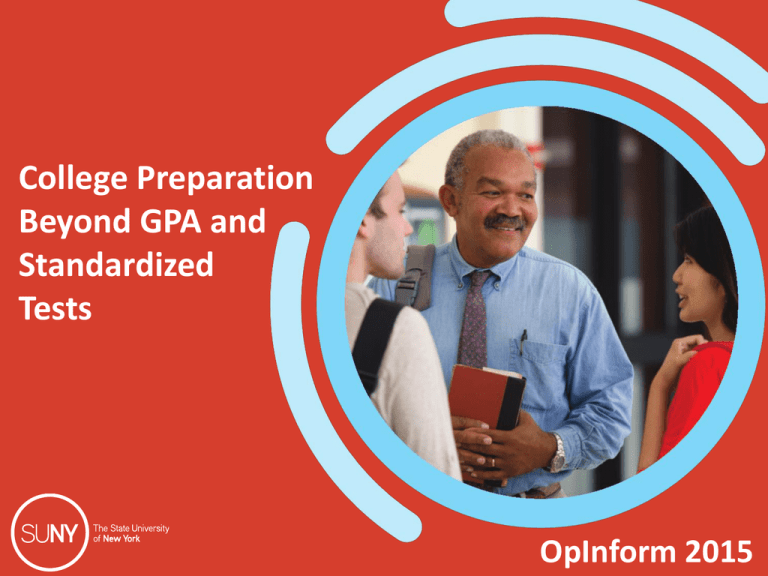
College Preparation Beyond GPA and Standardized Tests OpInform 2015 OpInform 2015 The Purpose of this Presentation To provide awareness of non-cognitive student characteristics and how they contribute to college student success. To share how some college admissions offices measure non-cognitive characteristics. OpInform 2015 Cognitive vs. Non-Cognitive Cognitive variables measure an individual’s prior performance through high school GPA, standardized test scores, coursework, rigor, etc. Typically on a numeric scale and can be compared between candidates. Non-cognitive variables relate to adjustment, motivation, and perception. OpInform 2015 What are Non-Cognitive Student Characteristics? Refer to non-academic abilities and are connected to student motivation, attitudes, behaviors, and ability to adjust. Standardized achievement tests do not measure non-cognitive characteristics. Some examples include: Student Strengths Inventory (SSI) Non-Cognitive Characteristics Self Efficacy Academic Engagement Resiliency Social Comfort Campus Engagement Educational Commitment • Confidence in academic ability. • “I expect to do well in school so I will.” • Work ethic and motivation. • “I always study and submit homework on time.” • The student’s approach to stressful situations. • “I try to take care of problems immediately.” • The student’s comfort with social situations. • “I have the ability to make friends quickly.” • The student’s willingness to become involved. • “I’m involved in many extracurricular activities.” • The student’s commitment to college. • “A college education is important to me.” OpInform 2015 Situational Judgement Index Knowledge, learning, mastery of general principles Continuous learning, intellectual interest and curiosity Artistic and cultural appreciation and curiosity Multicultural tolerance and appreciation Leadership Interpersonal skills Social responsibility, citizenship and involvement Physical and psychological health Career orientation Adaptability and life skills Perseverance Ethics and integrity OpInform 2015 Sedlacek’s Non-Cognitive Variables Positive Self Concept Realistic Self Appraisal Preference for Long-Term Goals Availability of a Strong Support Person Significant or Successful Leadership Experience Demonstrated Community Service Knowledge Acquired in a Field OpInform 2015 Why are they important? Non-cognitive student characteristics account for 10 – 15% of the predictive variance toward college performance (Robbins et al, 2004). Non-cognitive characteristics are also connected to career performance and life satisfaction. Research suggests that non-cognitive characteristics are stronger predictors of college success for lowachieving, low income, first-generation students. OpInform 2015 NonCognitive Factors Standardized Test HS GPA 5 – 8% Student Success OpInform 2015 Why are they Important? For Students For Counselors For Colleges OpInform 2015 Benefits for Students Many non-cognitive characteristics may be learned (Campus Labs, 2013; Robbins, et al, 2004; Sedlacek, 1993). Enhancements will increase the likelihood of college success. OpInform 2015 Benefits for High School Counselors Many non-cognitive characteristics may be taught (Campus Labs, 2013). Provides other ways to bolster career readiness. Imparts hope for students who have underperformed - especially on standardized tests. Colleges are catching on… OpInform 2015 Benefits for Colleges Enhances ability to identify college-ready students. Increases understanding of the non-cognitive challenges students will face. Success in college is not just a classroom issue. OpInform 2015 How do College’s measure Non-Cognitive Characteristics? College essays Letters of recommendation College interviews Follow up letters and emails High school transcripts (*sometimes) OpInform 2015 Discussion Building Self Efficacy Developing Academic Engagement Fostering Resilient Students Nurturing Social Engagement Enhancing Campus Engagement Raising Educational Commitment OpInform 2015 References Campus Labs. (2013). Using non-cognitive factors of Beacon in advising. Buffalo, NY: Campus Labs. Retrieved on February 13, 2015 from: http://beaconsupport.campuslabs.com/attachments/token/ray7w4c1erhriyx/?name=Using+the+Noncognitive+Factors+of+Beacon+in+Advising.pdf Robbins, S. B., Lauver, K., Le, H., Davis, D., & Langley, R. (2004). Do psychosocial and study skill factors predict college outcomes? A meta-analysis. Psychological Bulletin, 130(2), 261-288. doi: 10.1037/00332909.130.2.261 Sedlacek, W. E. (1993). Employing noncognitive variables in admissions and retention in higher education. In Achieving diversity: Issues in the recruitment and retention of underrepresented racial/ethnic students in higher education (pp. 33-39). Alexandria VA: National Association of College Admission Counselors. Staltonstall, M. (2013). Predicting college success: Achievement, demographic, and psychosocial predictors of firstsemester college grade point average (Doctoral dissertation). Northern Arizona University, Arizona. Ting, S. R. (2003). A longitudinal study of non-cognitive variables in predicting academic success of first-generation college students. College and University, 78(4) 27-31. Retrieved from http://search.proquest.com.pluma.sjfc.edu/education/docview/225614521/995BEE7F051A40B4PQ/2?accou ntid=27700 OpInform 2015 Questions?
